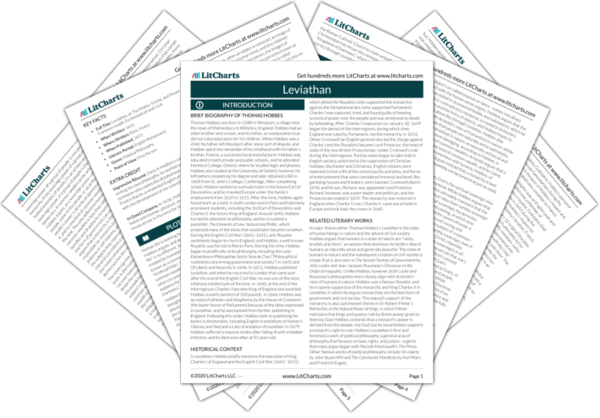Subject Quotes in Leviathan
And words whereby we conceive nothing but the sound, are those we call Absurd, Insignificant, and Non-sense. And therefore if a man should talk to me of a round Quadrangle; or accidents of Bread in Cheese; or Immateriall Substances; or of A free Subject; A free-Will; or any Free, but free from being hindered by opposition, I should not say he were in an Errour; but that his words were without meaning; that is to say, Absurd.

Unlock explanations and citation info for this and every other Leviathan quote.
Plus so much more...
Get LitCharts A+And therefore the voluntary actions, and inclinations of all men, tend, not only to the procuring, but also to the assuring of a contented life; and differ onely in the way: which ariseth partly from the diversity of passions, in divers men; and partly from the difference of the knowledge, or opinion each one has of the causes, which produce the effect desired.
For who is there that does not see, to whose benefit it conduceth, to have it believed, that a King hath not his Authority from Christ, unlesse a Bishop crown him? That a King, if he be a Priest, cannot Marry? That whether a Prince be born in lawfull Marriage, or not, must be judged by Authority from Rome? That Subjects may be freed from their Alleageance, if by the Court of Rome, the King be judged a Heretique? That a King (as Chilperique of France) may be deposed by a Pope (as Pope Zachary,) for no cause; and his Kingdome given to one of his Subjects?
Fifthly, and consequently to that which was sayd last, no man that hath Soveraigne power can justly be put to death, or otherwise in any manner by his Subjects punished. For seeing every Subject is Author of the actions of his Soveraigne; he punisheth another, for the actions committed by himselfe.
Of which, this is one, That a man to obtain a Kingdome, is sometimes content with lesse Power, that to the Peace, and defence of the Common-wealth is necessarily required.
To the contrary, I find the Kingdome of God, to signifie in most places of Scripture, a Kingdome properly so named, constituted by the Votes of the People of Israel in peculiar manner; wherein they chose God for their King by Covenant made with him, upon Gods promising them the possession of the land of Canaan; and but seldom metaphorically; and then it is taken for Dominion over sinne; (and only in the New Testament;) because such a Dominion as that, every Subject shall have in the Kingdome of God, and without prejudice to the Soveraign.
To this, and such like resemblances between the Papacy, and the Kingdome of Fairies, may be added this, that as the Fairies have no existence, but in the Fancies of ignorant people, rising from the Traditions of old Wives, or old Poets: so the Spirituall Power of the Pope (without the bounds of his own Civil Dominion) consisteth onely in the Fear that Seduced people stand in, of the Excommunication; upon hearing of false Miracles, false Traditions, and false Interpretations of the Scripture.












